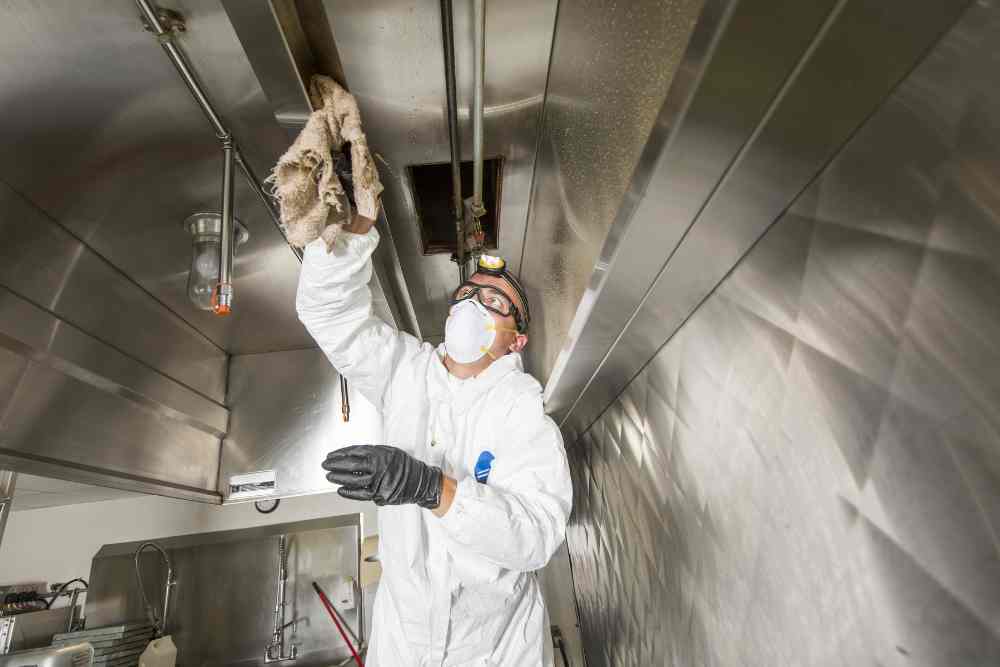How to Clean Organic Matter From Kitchen Exhaust Systems

Ontario-wide Kitchen Exhaust and Hood Cleaning – Best prices and service guaranteed.
Kitchen exhaust systems play a crucial role in maintaining a clean and healthy environment in commercial kitchens. However, over time, these systems can accumulate organic matter such as grease, oil, and food particles, which can pose serious health and fire hazards. Regular cleaning and maintenance of kitchen exhaust systems are essential to ensure their optimal performance and prevent potential risks. In this article, we will explore effective methods and best practices for cleaning organic matter from kitchen exhaust systems.
The Importance of Cleaning Kitchen Exhaust Systems
Before delving into the cleaning process, it is important to understand why regular cleaning of kitchen exhaust systems is necessary. Here are some key reasons:
Ontario-wide Kitchen Exhaust and Hood Cleaning – Best prices and service guaranteed.
- Fire Prevention: Grease and oil buildup in kitchen exhaust systems can become highly flammable, increasing the risk of fire. According to the National Fire Protection Association (NFPA), nearly one-third of restaurant fires are caused by grease buildup in exhaust systems.
- Air Quality: A dirty exhaust system can release harmful pollutants and odors into the air, compromising the indoor air quality of the kitchen and surrounding areas. This can lead to health issues for kitchen staff and customers.
- Efficiency: Accumulated grease and organic matter can obstruct airflow in the exhaust system, reducing its efficiency. This can result in increased energy consumption and decreased ventilation effectiveness.
- Compliance: Regular cleaning of kitchen exhaust systems is often required by local fire codes and health regulations. Failure to comply with these regulations can lead to penalties, fines, and even closure of the establishment.
Ontario-wide Kitchen Exhaust and Hood Cleaning – Best prices and service guaranteed.
The Cleaning Process
Now that we understand the importance of cleaning kitchen exhaust systems, let’s explore the step-by-step process to effectively remove organic matter:
1. Inspection and Assessment
Before starting the cleaning process, it is crucial to conduct a thorough inspection of the kitchen exhaust system. This involves examining the hood, ductwork, and exhaust fan to identify areas with heavy grease buildup or other organic matter. It is recommended to document the condition of the system and take photographs for reference.
2. Preparation
Ontario-wide Kitchen Exhaust and Hood Cleaning – Best prices and service guaranteed.
Proper preparation is essential to ensure a safe and effective cleaning process. Here are some key steps to follow:
- Turn Off Equipment: Before cleaning, make sure all cooking equipment is turned off to prevent any accidental activation during the process.
- Protect Surrounding Areas: Cover countertops, appliances, and other nearby surfaces with plastic sheets or drop cloths to prevent any damage or contamination.
- Wear Protective Gear: Put on personal protective equipment (PPE) such as gloves, goggles, and aprons to protect yourself from chemicals and debris.
- Prepare Cleaning Solutions: Depending on the level of grease buildup, select appropriate cleaning solutions. It is recommended to use non-toxic, biodegradable degreasers to minimize environmental impact.
3. Cleaning the Hood
Ontario-wide Kitchen Exhaust and Hood Cleaning – Best prices and service guaranteed.
The hood is the first component of the kitchen exhaust system that requires cleaning. Follow these steps:
- Remove Grease Filters: Take out the grease filters from the hood and soak them in a sink or tub filled with warm water and degreaser. Scrub them gently to remove grease and rinse thoroughly before reinstalling.
- Clean the Hood Interior: Use a degreaser and a scrub brush to clean the interior surfaces of the hood, including the walls and the underside. Pay special attention to areas with heavy grease buildup.
- Wipe Down the Hood Exterior: Clean the exterior surfaces of the hood using a damp cloth or sponge and a mild detergent. Remove any visible dirt or stains.
Ontario-wide Kitchen Exhaust and Hood Cleaning – Best prices and service guaranteed.
4. Cleaning the Ductwork
The ductwork is the most critical part of the kitchen exhaust system, as it carries the air and grease vapors away from the kitchen. Cleaning the ductwork requires specialized tools and expertise. It is recommended to hire professional exhaust cleaning services to ensure thorough cleaning and compliance with regulations.
5. Cleaning the Exhaust Fan
Ontario-wide Kitchen Exhaust and Hood Cleaning – Best prices and service guaranteed.
The exhaust fan is responsible for pulling air through the kitchen exhaust system. Here’s how to clean it:
- Turn Off Power: Ensure the power to the exhaust fan is turned off before cleaning to prevent any accidents.
- Remove Fan Cover: Take off the fan cover and clean it separately using a degreaser and a cloth or brush.
- Clean Fan Blades: Use a degreaser and a brush to clean the fan blades, removing any grease or dirt buildup. Be careful not to bend or damage the blades.
- Reassemble and Test: Once the fan components are clean and dry, reassemble them and turn on the power to ensure the fan is functioning properly.
6. Post-Cleaning Inspection
After completing the cleaning process, conduct a post-cleaning inspection to ensure all areas of the kitchen exhaust system are clean and free from organic matter. Use a flashlight to check for any remaining grease or debris in hard-to-reach areas. Take photographs to document the cleanliness of the system for future reference.
Ontario-wide Kitchen Exhaust and Hood Cleaning – Best prices and service guaranteed.
Best Practices for Maintaining Clean Kitchen Exhaust Systems
Cleaning kitchen exhaust systems is not a one-time task; it requires regular maintenance to prevent the buildup of organic matter. Here are some best practices to follow:
- Establish a Cleaning Schedule: Create a cleaning schedule based on the volume of cooking and the type of food prepared in the kitchen. High-volume kitchens may require monthly or quarterly cleanings, while low-volume kitchens may need cleanings every six months.
- Train Staff: Educate kitchen staff on the importance of maintaining a clean kitchen exhaust system and provide training on proper cleaning techniques.
- Monitor Grease Trap: Regularly inspect and clean the grease trap to prevent grease from entering the kitchen exhaust system.
- Keep Records: Maintain detailed records of cleaning activities, including dates, cleaning methods, and any issues identified during inspections.
- Hire Professionals: Consider hiring professional exhaust cleaning services to ensure thorough cleaning and compliance with regulations.
Ontario-wide Kitchen Exhaust and Hood Cleaning – Best prices and service guaranteed.
Cleaning organic matter from kitchen exhaust systems is crucial for fire prevention, maintaining air quality, ensuring efficiency, and complying with regulations. The cleaning process involves inspecting and assessing the system, preparing the area, cleaning the hood, ductwork, and exhaust fan, and conducting a post-cleaning inspection. Regular maintenance and following best practices, such as establishing a cleaning schedule, training staff, and hiring professionals when needed, are essential for maintaining clean and safe kitchen exhaust systems. By implementing these practices, commercial kitchens can ensure the optimal performance of their exhaust systems and create a healthier environment for their staff and customers.
Learn more about “Cleaning Organic Matter From Kitchen Exhaust Systems” here.
Frequently Asked Questions about How to Clean Organic Matter From Kitchen Exhaust Systems

What types of organic matter typically accumulate in kitchen exhaust systems?
Organic matter in kitchen exhaust systems primarily consists of grease, oils, and food particles. The accumulation of such substances occurs due to cooking processes, where vapors carrying these particles are sucked into the exhaust system. These organic materials can solidify and adhere to the ducts, filters, and fans, posing significant fire risks and operational inefficiencies if not adequately cleaned.
Why is it crucial to thoroughly clean organic matter from kitchen exhaust systems?
Efficient cleaning of organic matter is vital for several reasons:
Fire Prevention: Organic matter like grease is highly flammable and can ignite, causing severe kitchen fires.
Hygiene and Health: Accumulation can lead to mold growth and bacterial contamination, which can impact air quality and food safety.
Operational Efficiency: A build-up of organic matter can decrease airflow and the overall efficiency of the exhaust system, leading to poor ventilation and higher energy consumption.
Compliance: Regular cleaning is mandated by health and fire safety regulations to maintain a safe and healthy kitchen environment
How often should kitchen exhaust systems be cleaned to remove organic matter?
The cleaning frequency depends on the type and volume of cooking:
High-Volume Cooking or Use of Solid Fuels: A monthly cleaning is recommended.
Moderate-Volume Cooking Establishments: A quarterly cleaning might suffice.
Low-Volume Cooking and Seasonal Operations: Semi-annual or annual cleaning may be adequate. Regular inspections and adherence to local fire codes will help determine the appropriate cleaning schedule for each kitchen.
What is the recommended process for cleaning organic matter from kitchen exhaust systems?
A thorough cleaning process typically involves:
Inspection: A comprehensive assessment to identify the accumulation of organic matter in various components.
Degreasing: Application of industrial-grade degreasers to dissolve hardened grease and oil deposits.
Scraping and Brushing: Manual removal of stubborn deposits from ducts, fans, and other components.
Pressure Washing: Utilization of high-pressure hot water to remove loosened debris and residual cleaning agents.
Waste Disposal: Proper disposal of extracted organic matter and cleaning residues as per environmental guidelines.
What considerations should be made when selecting a service provider for cleaning organic matter from kitchen exhaust systems?
When choosing a service provider, consider the following:
Certification and Experience: Ensure the provider is certified and experienced in kitchen exhaust cleaning and adheres to industry standards, such as those set by the National Fire Protection Association (NFPA).
Comprehensive Service: Opt for providers offering complete cleaning of all components, including ducts, fans, and filters, and providing before-and-after documentation.
Environmental Compliance: Ensure the provider adheres to local environmental regulations for the use of cleaning agents and disposal of waste.
Availability and Reliability: Choose a provider that can accommodate your operational hours and has a reputation for reliability and professionalism.
- hood cleaning
- How to Clean Organic Matter From Kitchen Exhaust Systems
- kitchen exhaust cleaning
- restaurant hood cleaning






